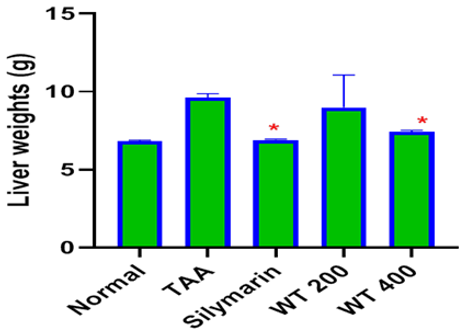Abstract
The plants belong to the genus Wrightiaare widely distributed throughout the world. Wrightiatinctoria (WT) plant species are being used in folk medicine for the treatment of several diseases. The review of the literature suggests that a good number of preclinical have confirmed the medicinal use of various Wrightiatinctoria species that have been mentioned in traditional medicine. The extract of Wrightiatinctoria was given daily to the rats, at doses of two hundred and 400 mg/kg along with thioacetamide to assess the affectivity of extract, against thioacetamide-induced hepatotoxicity. Serum samples were collected for analysis of various hepatoprotective parameters like aspartate transaminase, alanine transaminase, antacid phosphatase and total bilirubin, using commercially available test kits, together with morphological and histopathological indices in the liver of healthy and thioacetamide treated rats. Animals were sacrificed from each group, and their livers were dissected out for histopathological studies. Results of the present study suggest that the methanolic extract of Wrightiatinctoria leaves possess significant hepatoprotective activity on thioacetamide-induced hepatotoxicity, which might be associated with its high phenolic and flavonoid content and antioxidant properties. In conclusion, the present study depicts the curative efficacy of Wrightiatinctoria in an in-vivo experimental system.
Full text article
Authors

This work is licensed under a Creative Commons Attribution-NonCommercial-NoDerivatives 4.0 International License.

